Summer study abroad program immerses incoming freshmen in technology, culture of Taiwan
| Author: | Della K. Pacheco |
|---|
In a first for Purdue, 20 pre-freshmen engineering students visited Taiwan as part of a summer program to immerse students in semiconductor technology, language and culture. The students were selected based on their interests in semiconductors and language learning background.
Dr. Wei Qiu, Asia Pacific programs manager for Purdue’s Global Engineering Program and Partnerships (GEPP); Sarah Allard, lead academic advisor for undergraduate students in the School of Aeronautics and Astronautics; and Heather Fabries, global co-op specialist with the Office of Professional Practice, led the group visiting faculty and students at three universities: National Yang Ming Chiao Tung University (NYCU), National Cheng Kung University (NCKU), and National Taiwan Normal University (NTNU) – all strategic partners of Purdue who made this program possible.
The group visited several labs, including NYCU’s Nano Facility Center, known as the cradle of Taiwan’s semiconductor research and technology, to learn the ins and outs of semiconductor research and teamwork. They also attended a lecture at NCKU on Taiwan's semiconductor industry.
Purdue is leading the initiative of semiconductor research and workforce training, Qiu said, and the pre-freshmen engineering program in Taiwan aims to familiarize students with the semiconductor industry and cultural landscape as early as possible.
The itinerary included visits to the Taiwan Semiconductor Manufacturing Company (TSMC) Museum of Innovation, where students learned about the story of TSMC’s founding, its unique values and its global operations. They also experienced the futuristic life empowered by TSMC’s chip products with VR sets and had a virtual Q&A session with TSMC founder Dr. Morris Chang. Purdue and TSMC recently extended its partnership, expanding their collaboration through additional workforce development and research programs through 2031.
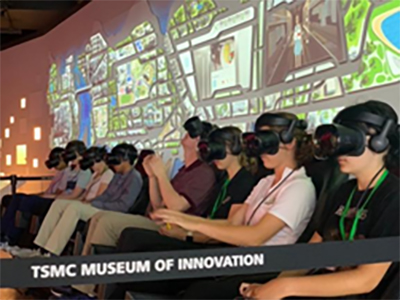
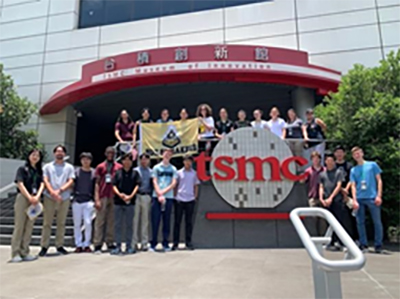
For the final project, students were tasked with scripting, creating, directing and performing a traditional shadow puppet show, allowing the participants to gain unique and thoughtful insights into the field. Four teams produced the shows, including managing the budget for purchasing materials for the puppets and the theater stage.
“The goal of the trip was to help the students realize that engineering is not just about building bridges or codes, it’s about people and enhancing their quality of life by addressing significant challenges facing humanity,” Qiu said. “The shadow puppet show served as an inspiration for students to actively explore Taiwanese culture, apply their creativity to real-world engineering challenges, and think outside the box. It’s wonderful to see students reflect on various approaches to defining and solving engineering problems that are culturally relevant and learn to connect people through compelling stories and technologies.”
The shows included topical themes such as water shortage and the subsequent tension between the semiconductor industry and other sectors such as farming due to drought/water issues, working culture clash between Americans and Taiwanese, the issue of technology adoption due to cultural differences.
The students drew inspiration from a field trip to the Shadow Puppet Show Museum in Kaohsiung, where they interacted with a famous Zhang family troupe with over 200 years of history in performing puppet shows.
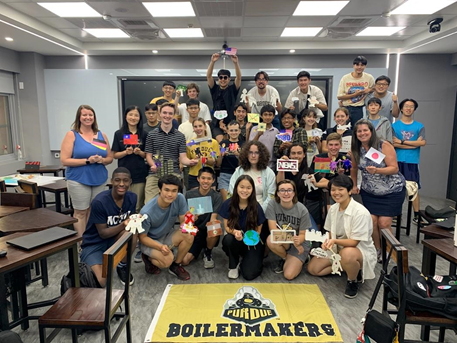
Three of the students who participated are Leo Janert from New Mexico, Alex Kaufman from the Chicagoland area, and Addison Stindle from Fishers, Indiana. Janert said he learned that it is essential to think from a different perspective, experience a new culture, and challenge oneself. “The joy of making new friends, including incoming Purdue freshmen and Taiwan undergraduates, was priceless.”
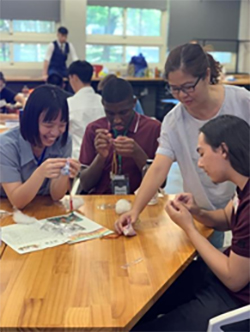
Kaufman chose Purdue because of its strong engineering reputation. He participated in the Taiwan program “to gain this experience prior to my start in college so I could look at future engineering problems I encounter through a different lens.”
“My group explored the issue of how to deal with the drought, as water was being taken from farmers to keep the semiconductor factories running,” Kaufman said. “In studying the issue I realized it was not just an issue about fairness. The farmers had a deep connection to their land and would lose it if they could no longer grow crops, but the semiconductor factories are the primary source of economic and political strength of Taiwan. Working through this issue I learned that exploring the cultural receptions of a solution is an integral piece of the engineering design process.” He hopes to use this to guide him in finding engineering solutions that are received well in other unique cultures.
Stindle, who plans to major in aeronautical and astronautical engineering, said the collaboration and skills she learned will make her a better group member, friend, colleague and leader.
“I believe the trip to Taiwan will greatly assist me in working with all kinds of people and personality types,” she said. “Any collaborative work will benefit from my experiences on this trip in communication, understanding and problem solving.”
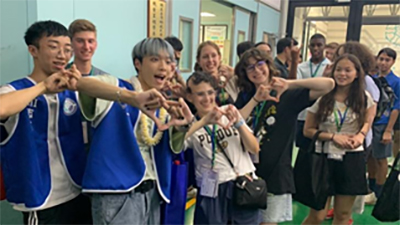
GEPP collaborates with units, faculty, and staff to plan, develop, and execute global engineering programs. Thank you to all involved in making these programs and initiatives a reality.
